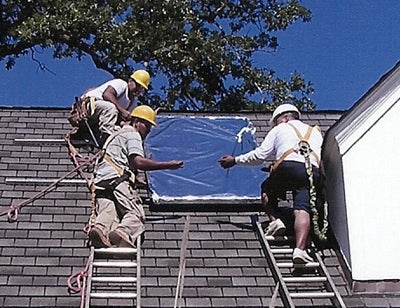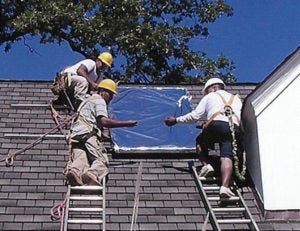Tell us about your solar job, part 2


– Hyattsville Solar Co-op Member Fran Toler
The solar industry employs workers with a range of skill sets. We thought it would be interesting to hear from them in their own words. Today we spoke with David Desarjins of Affordable Energy Concepts, Suzanne Kanz of Solar Services Inc., Scott Johnson of Advanced Solar Technologies LLC, and Brett Stone of Direct Energy Solar.
How did you get involved in the solar industry?
Scott Johnson: I was fascinated by “making” energy from sun light. I still enjoy seeing a PV system turned on in the middle of the summer with the air conditioning running and still running the utility meter backwards.
Brett Stone: In 2008, the US had a major housing market collapse. At the time I was working as an electrician doing new home build outs and total house wiring. Solar was just becoming popular on the East Coast, so getting into the industry was a no-brainer. I started training under Infinite Solar, out of Philadelphia PA. It’s an advanced hands on course that gave me the IREC (Interstate Renewable Energy Council) accreditation as a Pennsylvania Solar Installer at a cost.
People think of solar jobs as just being up on a roof installing panels. What other types of positions or employees do solar companies look for?
David Desjardins: We do spend quite a bit of time installing systems, but that is only a portion of the work. Before we get to the installation we must perform a thorough site assessment, design the system, and then have everything approved. You will find that many companies have salesmen, designers, project managers, installers, and engineers.
BS: The solar company is built under two main roles, sales and operations. Sales teams consist of the initial survey, which requires someone with aerial imagery knowledge and drawing capability, and a sales team member who will physically go out and meet with customers. Operationally after sale, you have a physical survey that requires measuring actual dimensions on site, project management which requires permitting, an electrical reviewer who will take a close look at the capabilities of the house’s electric, and finally the field teams that actually install the product who are generally installers and electricians. Within all of these functions there several management positions to lead all of these teams.
What skill sets do you see as most important to building a career in the solar industry?
Suzanne Kanz: It depends on the position. For a solar technician you would need to be able to follow directions, have knowledge of common tools and how to use them, be able to handle heights, be able to learn.
SJ: As with any industry, you should have an interest in the specific job position that you are seeking. There is a vast array of skill sets required for a solar company to fully function. Generally, if you enjoy the job requirements, you will be successful at it.
Describe your specific role with your company?
DD: I follow projects from contract signing to completion making sure that we have everything accounted for, from an approved design to materials to the appropriate crew to perform the installation.
BS: I began as a boots on the roof installer. I worked my way into a lead installer, then to a field operations trainer. From there I became field operations manager, then safety director, and fleet manager. I currently oversee quality control, training, and new product development. My job is to make sure we have standards in place, training is created and taught, and oversee new product roll outs.
What kind of training do you need to for your position (installer, sales, electrician)?
DD: We provide on the job training for all of our installers. An installer must have the willingness to learn and the ability to work on roofs and in attics. After training our installers will know how to assemble and install the panels and racking. Further training could include a NABCEP solar installer certification. To be an Electrician one must have either a Journeyman’s or a Master Electrician’s License. Both require having formal training, previous work, having knowledge about the NEC, and passing exams.
SJ: Nothing is more educational than real world on the job training. But taking classes such as business administration, PV design/installtion, and electrician will let you know if it is a carrier that you would like to pursue as well as give you some knowledge of the industry so that you are bringing some qualification to the job that you are applying for.
Can you describe your typical day or week on the job?
DD: A typical day for me starts with my to do list and a cup of coffee. I briefly review every project that I have and the next steps for each project. After that I start crossing off items on my list and moving my projects. Then I spend some time talking with our designers, suppliers, and customers to make sure that everyone’s needs are meet. During a week you can also see me applying for permits, climbing a roof, or meeting with potential customers.
SK: Every day is different. My typical day starts with opening the shop, making sure everyone does what is expected from them. Doing my daily tasks consist of approving ordering of product, Use Tax, signing and checking all the bills and payroll, dealing with customers, meeting with potential clients and anything that needs to be taken care of that may arise.
What advice would you give to someone who wanted to join the industry? Any recommended first steps for someone new to the industry?
SK: I would advise anyone that is interested in solar to go to a solar company and ask questions and spend time with the sales staff and the installation crew. Check with your local community college and see if they offer any courses for alternative energy.
BS: There is a lot of excitement evolving right now around PV Solar. I suggest doing research. If you want to do installations, enroll in a course early and learn about the industry to gain general knowledge. Installing the solar system can be very physical work and may require long days. Sales can also be another side of the business. The North American Board of Certified Energy Professionals (NABCEP) offers an entry-level course and certification that’s worth taking. If you are new to the industry, learning the basics of electrical theory can be a challenge, but its knowledge that puts you a step ahead of others. Most importantly, you have to believe in your work, and know that what you are doing is good for your customers and the planet.
What is the most rewarding part about your job?
DD: The most rewarding part of the job to me is when a customer calls back a couple months after we installed their system to tell us that there bill is lower than they expected. We constantly have customers showing us their lowered utility bills. That moment is the most gratifying moment is solar.
SK: I Love dealing with people and trying to help them go solar. I find it very rewarding to know I am in a field that helps the environment. I love the team we have here; it’s my pleasure to work beside them and educating people on the choice they have for alternative energy.
What was the most surprising thing about your job?
DD: Lately, I have been surprised by the growth in popularity of solar and the reduction in cost. Since I started working here almost two years ago the prices of solar systems have dropped about 20%. This means that solar is becoming more affordable to everyone in Virginia.
BS: The most surprising part about my job is the amount of interest nationwide. We have grown from two offices to currently 14 offices since 2010. I was on the road 26+ weeks last year sharing my knowledge, meeting with clients/manufacturers, installing, and training all across the country. The excitement is building, and so is the industry.
This is part two of a two-part series. For part one, click here.
